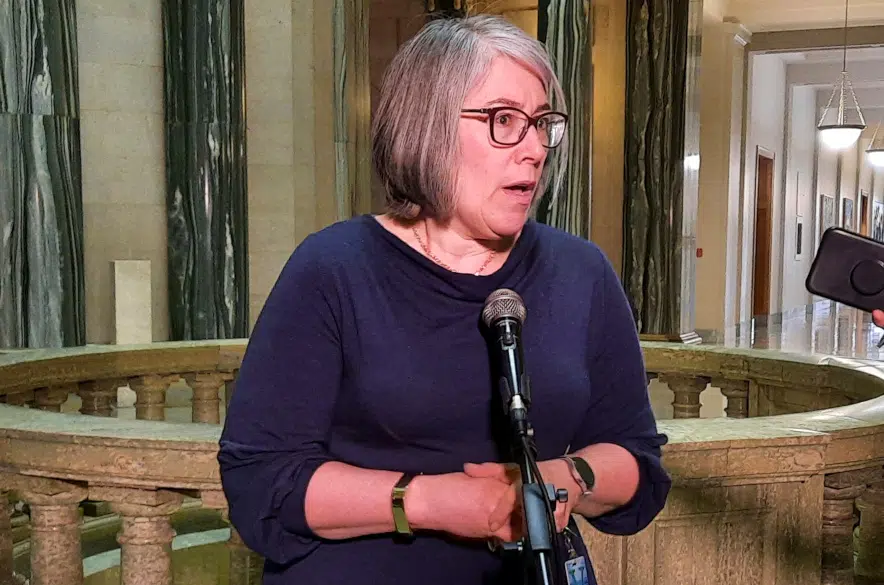It seems the University of Regina is scraping out its wallet and digging through the couch cushions as it prepares next year’s budget, and the school’s faculty association wants the province to fill in the gap.
According to Britt Hall, the faculty association’s president, the direction from administration has been explicit on budget cuts. Each faculty unit has been told to find between three and seven per cent to cut.
“These are not rumours. This is something that we’re hearing directly from our administration,” said Hall.
And while the administration has also said there won’t be any cuts to programs, Hall said that doesn’t mean there won’t be impacts. She expects, for example, that there will be fewer contracts signed for sessional lecturers.
“Which means that our full-time members will be required to pick up the load. And this might trickle down to mean that either the instruction is heavy enough that increases their mental health load and it also may really decrease their ability to do the other work that we do at the university, which includes things like research and scholarship,” explained Hall.
Things like the recent skyrocketing inflation rates and the lingering effects the pandemic had on the school — like international students having to stay away — are playing a role in the money problems the school is facing.
“Prior to the pandemic, the university had the ability to bring in students to fill their residence towers, for example, and now those students just aren’t,” Hall said, then paused for a moment. “We’re recovering from that.”
She admitted that post-secondary institutions are autonomous, but Hall also said public education is under the purview of the provincial government. As such, Hall is calling for the provincial government to provide emergency funding to the school.
Hall also wants the four-year funding agreement, which was signed three years ago, to be revisited.
“The four-year funding agreement is a (historic) funding agreement, but it’s in the past; it’s history,” said Hall. “Maybe it’s a good idea to revisit that MOU and perhaps think about it in the context of all of these other issues.”
The Saskatchewan NDP is joining the call for more funding, pointing to a funding cut that post-secondary institutions saw in 2017 that Advanced Education Critic Jennifer Bowes said has had snowball effects to now.
Advanced Education Minister Gord Wyant is not saying yes or no to emergency funding.
“Certainly there are some issues at the University of Regina but we’re confident that the university, through its president and its leadership team, are going to meet their financial challenges,” said Wyant.
The minister wants to wait until the university has finished its budget process. Then, he said, there could be a discussion about any more funding.
“We need them to finish the (budget) conversation so we know exactly where they’re going to be,” he said.
Wyant pointed to the four-year funding agreement, then also said universities are autonomous and make their own decisions so there are things they need to work out themselves in their budgets. But Wyant also said his government understands the importance of post-secondary to the economy and to the province.
He said he wants to continue a dialogue with post-secondary institutions to make sure they’re property supported.
Panic not setting in at U of S
While concerns over layoffs aren’t a major concern for the University of Saskatchewan Faculty Association (USFA), there is still room for improvement.
Faculty chair Geraldine Balzer says the association has seen a decrease in members in the past decade, but an increase in students.
In 2011, there were 1,105 in-scope faculty members and today there are 949, which is around a nine per cent decrease.
“Over that same time period, we have had a 20 per cent increase in graduate students and 13 per cent increase in undergraduate students,” Balzer said.
She said that’s one of its concerns as tuition has gone up, so students are paying more for larger classes and sessional lectures are being hired out to temporary contractors.
Balzer says tenured and permanent employees are involved in program and department discussions, which can be beneficial for the school.
“Contract employees don’t have that same investment in the university. They won’t be serving on as many committees,” Balzer added.
She said all of the sessional lecturers are great, but there is a bit of a drawback to having to rely on them.
“They don’t have the same view of the scope of a program because they come in to teach a class. And they’re not part of the planning within a college or a department and sort of understanding how everything fits together in a program,” she said.
There are currently 295 temporary workers compared to 253 a decade ago.
Balzer also highlighted that there isn’t as much of a focus on hiring replacements for retiring faculty members, which has led to the decrease in numbers.
The current USFA contract is to expire in June and negotiations on a new deal will begin in the coming weeks.
— With files from 650 CKOM’s Steve Seto











